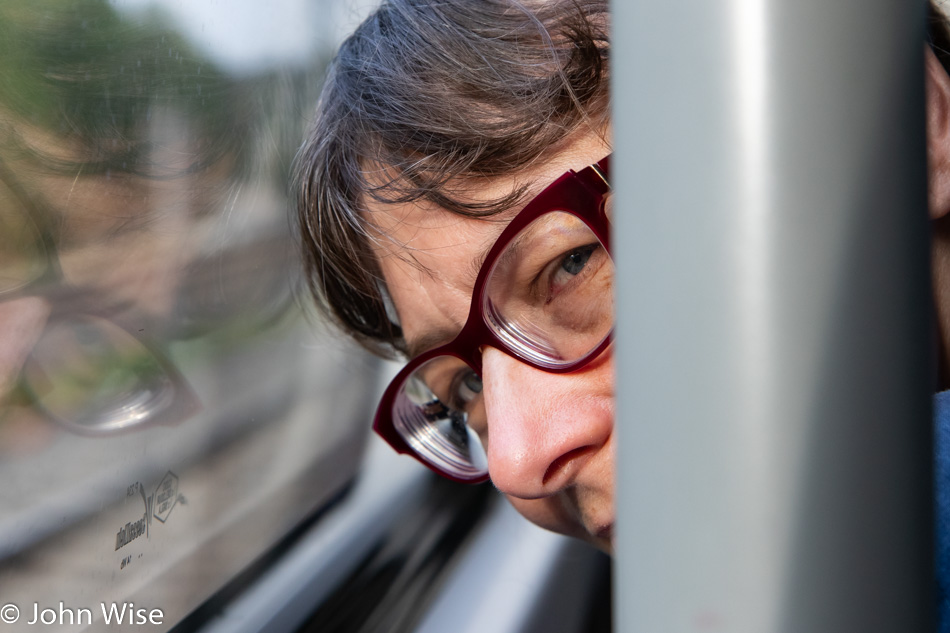
How is it that we are not sitting next to each other? Why is my wife in the row ahead of me? Because somehow I booked two window seats for us and seeing that it’s impossible to sit next to each other if we both are sitting next to a window then all that was left to decide was who sat in front of whom. The train we are on is one of the InterCity Express trains or I.C.E., sometimes called bullet trains or simply high-speed rail. We are speeding over the landscape today on our way to Karlsruhe, where Caroline’s father, Hanns lives, who also happens to be Father Hanns. With only about an hour to our destination, I have no time to waste on pleasantries and must get busy writing while the inspiration is striking.
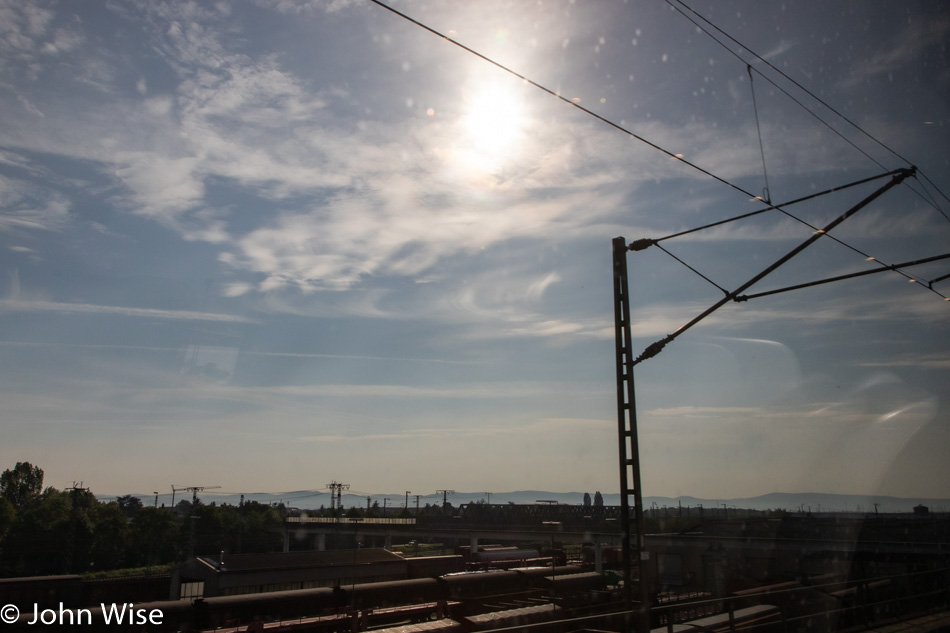
We are creating a new sense of place where the frontier moved out of the physical world into the online space of global connectivity, and the amorphous domain of digital immediacy dictates a fluidity attempting to understand nonsense and fact existing simultaneously in a new synthetic fabric of reality. There is a challenge of perception from our time-based organic neural networks and their digital counterparts where paths choose the efficiency of minds interconnected by devices tuned to receiving input, consuming it, and often tossing it into the pile of short-term storage where it will not find any longevity. How long-term threads can evolve out of this electronic hive mind and survive beyond instant gratification is one of the existential threats facing humanity. It is in this temporary playground divorced from real-world consequences that hostilities and the fomenting of dangerous ideas are evolving like bacteria under threat of extinction.
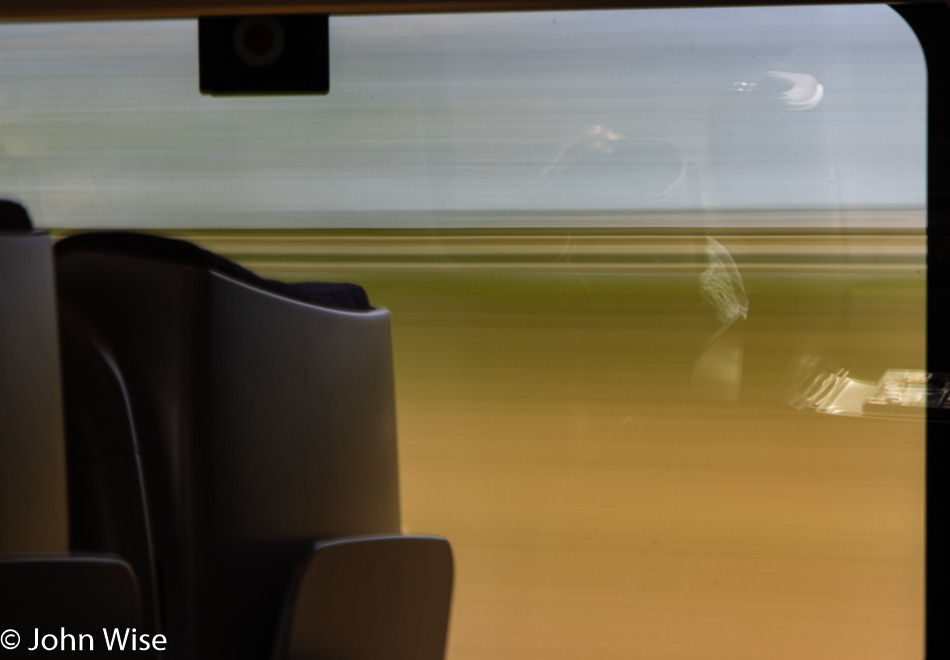
At what point does society at large recognize the imminent viral threat of hate that some see brewing on the horizon? Can we fully understand the inherent threat that accompanies the malignant tumor of intolerance? History, I believe, shows that the critical mass of awakening only occurs during the conflagration that moves societies to new, more progressive stances following the fatigue of combat. For the canaries expiring in the coal mine and Peter telling us he has seen the Wolf, it is no comfort to them in being the original but ignored harbinger of the news that something was about to go wrong. This then begs the question for me: can anything be done to ward off the pestilence that will move in to help society atone for its stupidity?
The voices of reason are in the unenviable position of parents (metaphorically speaking) telling the child not to reach into the fire. Only after the child attempts to flee from the enveloping flames with limbs rendered useless when the entire head is aflame with a disfiguring heat that melts features away will the child in the psychotic state of frenzy come to understand the dangers of throwing oneself into the bonfire. Until then, the foolish and immature believe they can see salvation in the flames of hell that war occupies.
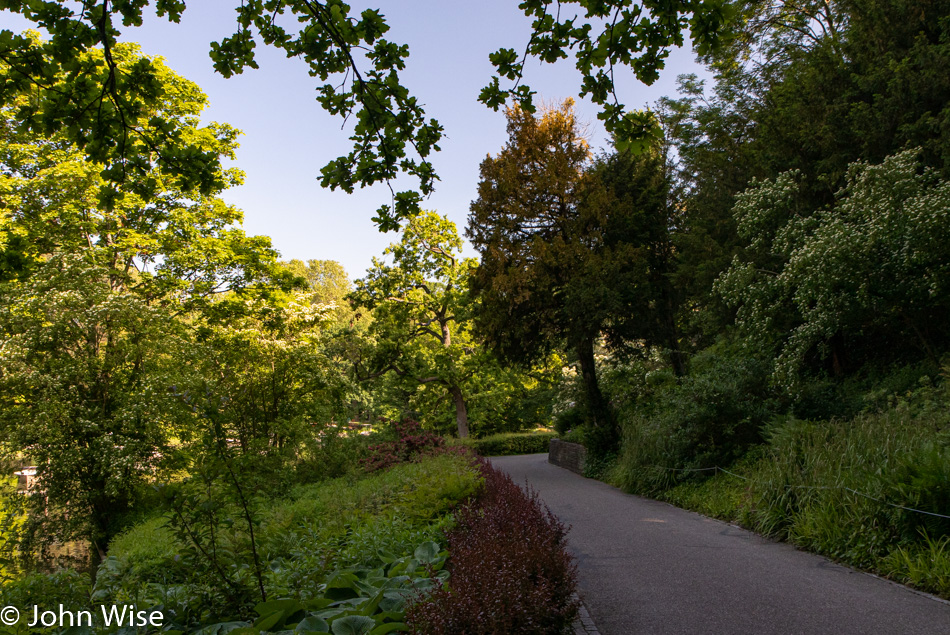
Did you think I contemplated lollipops while hurtling over the Rhineland? Caroline may be in front of me knitting a pair of socks but my brain is back here knitting scenes of the apocalypse that arises not from aggressors and saboteurs but from the criminally stupid whose utter lack of ideas force them into the cesspool of digested and rotting ideas that were never worth much more than the shit they were back when the excrement started falling out of the megalomaniac’s mouths who have taken us into conflict again and again.
On the bright side, we have safely arrived at the Karlsruhe Hauptbahnhof, where Father Hanns has been waiting for us. From the main train station, we head out the door and directly into the Zoological Gardens. Here’s a fun, useless fact for the reader: it’s only a 16km or 10-mile walk to France from here. Maybe you can see through this and recognize that it’s a note for Caroline and me to one day come back to the city her father has worked and lived in to make that walk along the Rhine River crossing the Alte Lauter River into France.
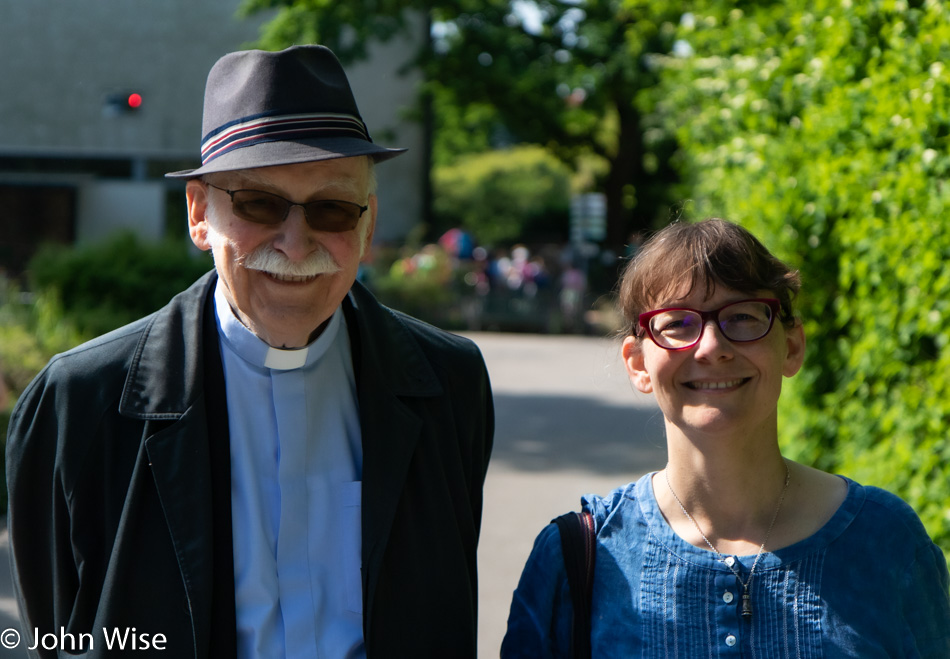
Spry is one of those love/hate words that, as much as I may dislike this cliched term, it actually does fit the image of Caroline’s father. With an intellectual pep, a great sense of humor, and an analytical mind that churns through thought with greater deftness than many people I’ve known half his age, it’s a pleasure to once again be in the company of Rev. Dr. Hanns Engelhardt, former judge at the Federal Court of Justice.
This retired judge, co-founder of the German-Hungarian Jurists’ Association, an Anglican priest, and author who has written riveting titles such as “Die Kirchensteuer in den Neuen Bundesländern” about church tax in the German federal states joined us today for an 11km or 7-mile walk around Karlsruhe. We started by entering the Zoologischer Stadtgarten, whose southern entry portal lies adjacent to the main train station.

Do you see God in the face of animals, or is the domain of the soul unique to humanity? Is heaven a construct of our desires or a literal representation of the apostles’ knowledge delivered by the voice of God? Did Nietzsche kill God, and did God then turn around and kill Nietzsche? Throw in a bit of Schopenhauer, who is Hanns’s favorite philosopher, and you have a snapshot of our conversation as we walked through the zoo.

Can you feel God? Yes, it is experienced as love. Can you see God? Yes, it is seen in consciousness. Is the law fair? In as much as the people administering it are able to be honest, yes. Do you fear death? I certainly do not welcome it before it must come, but it does appear to be an inevitability.
The thought that God is not a deity lying in wait but is the thread of our shared existence as cultural entities coexisting in a mindful thinking environment where a mutual sense of preservation of history, language, art, and traditions requires a common belief system and mythological framework is something to consider. The dogma of shoveling God into the image of a man with the inherent biases of proportional reward and punishment based on piety is archaic and fails to serve me. Should God exist it should be available to serve us instead of us serving him. This, then, should imply that we are acting on our behalf in as much as it benefits the rest of our species and reflects positively on what we have gained from our ancestors.
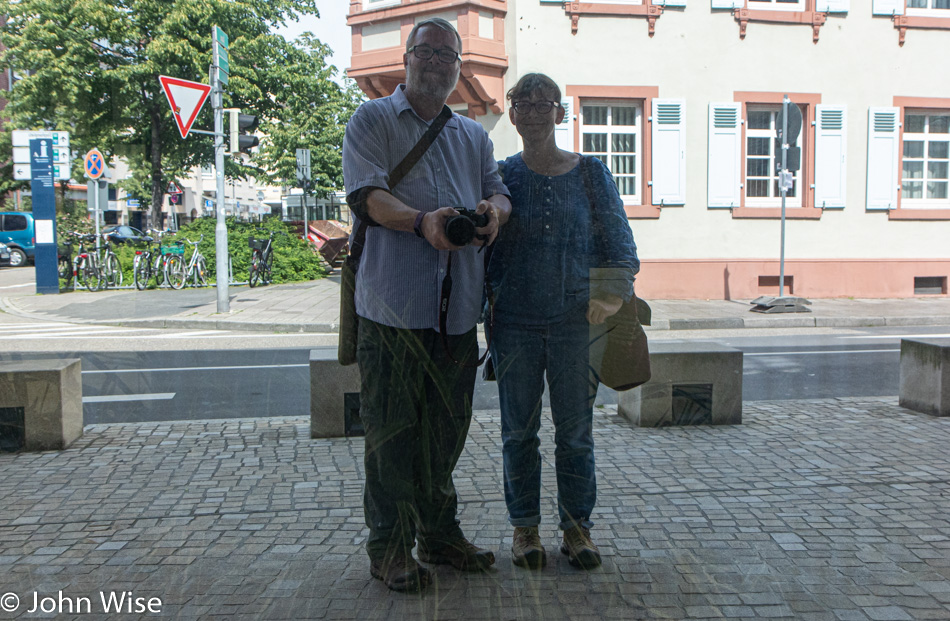
After exiting the Zoo at the northern end and passing a few of the infamous construction sites that Karlsruhe is notorious for, Hanns brought Caroline and me over to the Bundesgerichtshof, aka the Federal Court of Justice, for a look into the grounds from their courtyard so we could get a better view and a photo. However, we were not allowed to do as much as touch a camera while we were inside. Caroline had this great idea while we were waiting to learn if Hanns would even be able to bring us on the grounds as visitors when she noticed that the glass we were standing in front of was nearly a mirror. So here we are nearly 30 years later, recreating that very first photo we took of ourselves back in 1989, which I’d posted prior to leaving for our jaunt across Germany and the Balkans. The Bundesgerichtshof is where Hanns worked for the majority of his career before exchanging the robe of the judge for the robe of the priest.
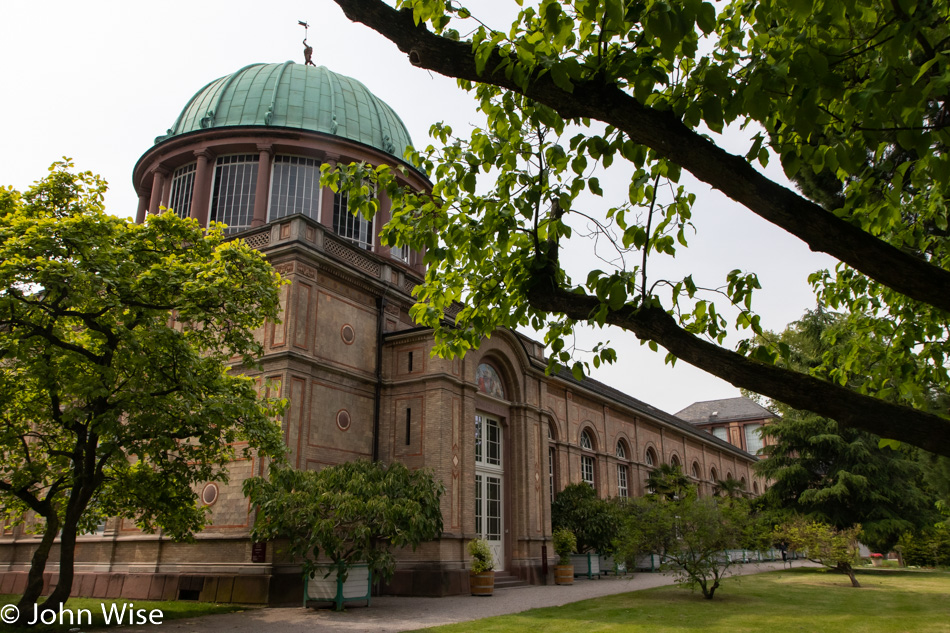
Schlossgarten is the next leg of our walk through the city of Karlsruhe. On previous visits, we’ve only moved between Hann’s small bungalow and a nearby restaurant that has become our regular go-to place for lunch; today will be no different. After trying some other items at the Badisch Brauhaus on Stephanienstrasse on previous visits, I finally ordered the Fleischkäse with fried egg and Bratkartoffeln though I did not join father and daughter for a glass of wine and instead stuck to my teetotaler ways and ordered my obligatory bottle of sparkling water.
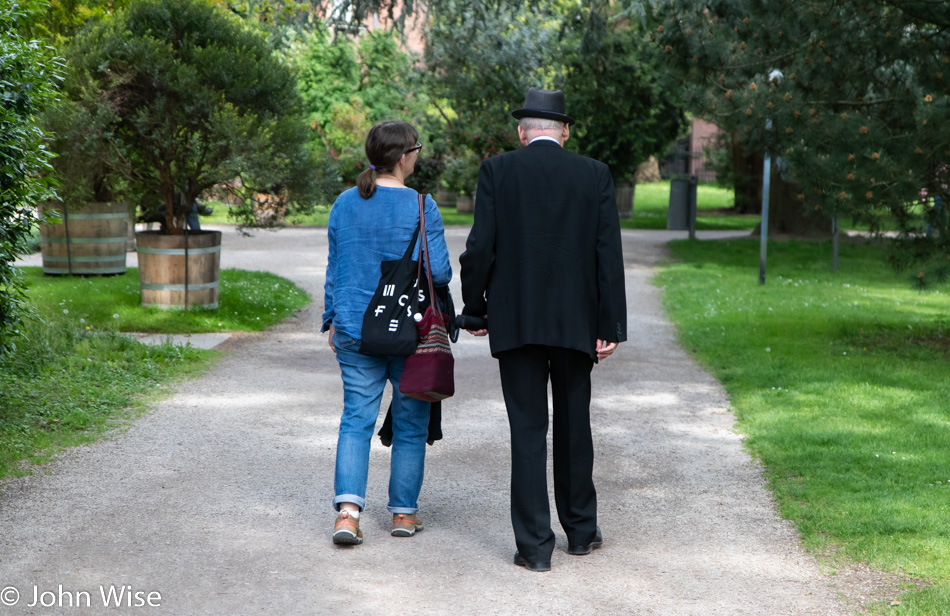
While not able to write and walk, I am able to hang behind or jump up front to take photos so I appear well occupied while Caroline has the opportunity to enjoy her father’s German wit and command of language that I feel inspires Caroline and her appreciation for his oft demanding intellect and command of the moment.
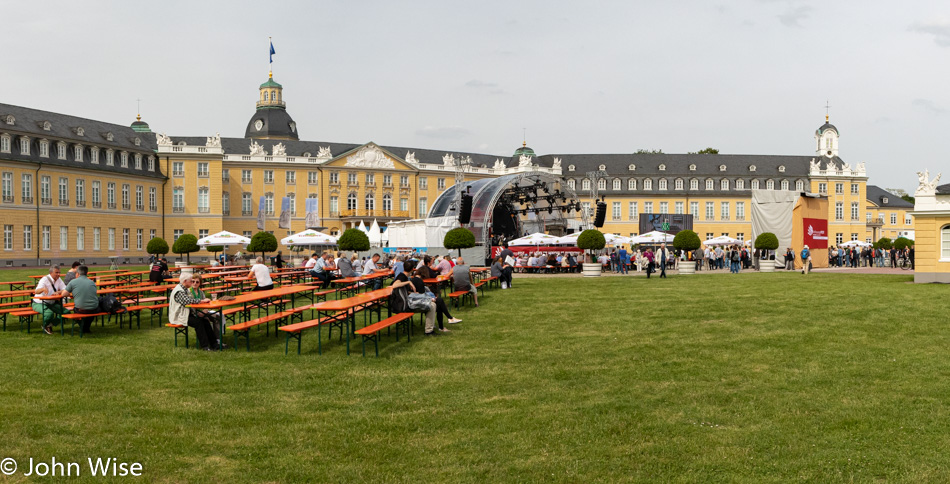
European elections are just around the corner this Sunday, and here in Karlsruhe, we happened to be so lucky to wander into VerfassungsFEST or Constitution Days. It was 70 years ago this week that the Federal Republic of Germany was established and the rule of Basic Constitutional Law or Grundgesetz was set forth. While Bonn was the capital of the newly formed West Germany, the courts were established in Karlsruhe. I am not sure if that was in order to maintain an independent court but that seems the logical reasoning behind the geographical separation. It was still early in the day while we were here on a Friday, but I was hoping that by evening and then on Saturday, there’d be a much larger gathering in celebration of 70 years of protecting civil rights and social values such as diversity, openness, and legal certainty, which the Basic Constitutional Law guarantees for all citizens.

Germany is walking into its future with a lot of uncertainty as the flames of intolerance are once again seeing their embers stoked. The long experiment to establish a unified Europe was broached back in 1920 by British economist John Maynard Keynes who called for a free trade union, and then in 1946, Winston Churchill became an advocate for the United States of Europe. It was ultimately the work of Chancellor Helmut Kohl of West Germany and President François Mitterrand of France that the European Union was formally established with the signing of the Maastricht Treaty on the 1st of November, 1993. So, while two powerfully influential Brits were once advocates for this social, political, and economic super union, it is Britain itself today that is working so hard to fracture the union that has begun to eclipse the financial might of the United States.
While America has played a key role on the world stage of promoting “ideas” of peace, dragged others into prosperity with our great ability to purchase consumer goods, and been a leader in the evolution of technology that has benefited humanity, there seems to be a fundamental breakdown in our collective desire to promote the health and welfare of our own citizens as we devolve our world view into one of outward hostility while simultaneously fostering an environment of intellectual mediocrity, disregard for our environment, and flaunting our ability to kill abroad and within. Don’t take me wrong; I love the opportunity and economic prosperity that is still alive and well within the borders of America; it’s just that I no longer see America trying to raise the standard and quality of life for its own citizens much less than for the rest of the people of our planet.
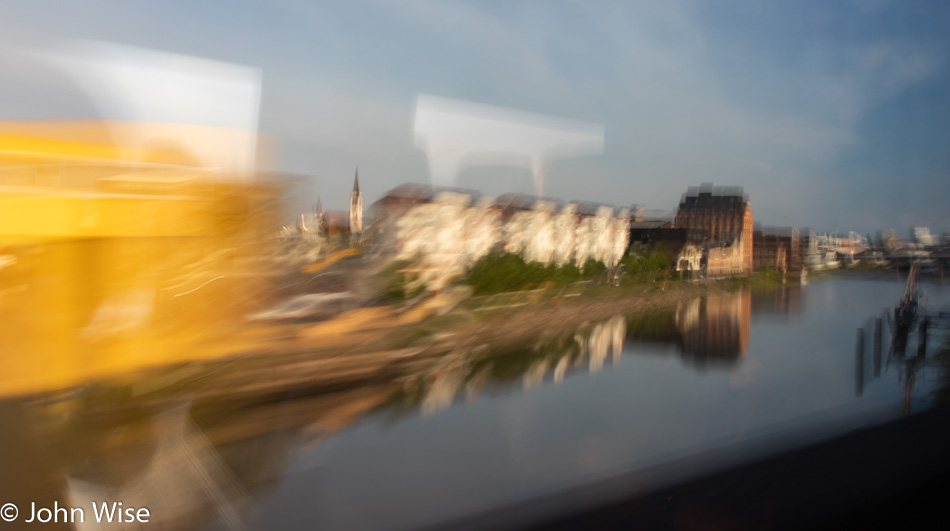
After bidding Hann’s farewell, we’re going back to Frankfurt, or are we?
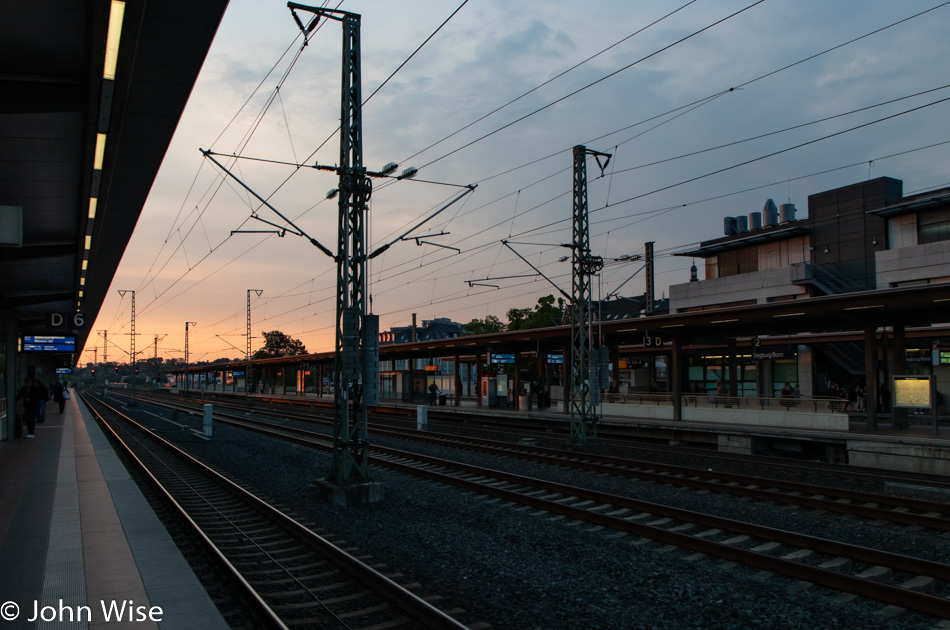
This is that Toto moment where references to Kansas can be made. We are at the Siegburg/Bonn train station about 100 miles north of where we should be in Frankfurt. Why is it that we are experiencing the sunset near the former capital of West Germany? Because when I asked my wife about the train and correct stops due to what I thought I read on one of the overhead signs regarding our trip to Frankfurt this afternoon, she didn’t pay attention to my concerns and simply reassured me everything was fine, except it was not. You see, we didn’t pay to travel from Karlsruhe to Bonn; we paid to go to Frankfurt. My first thought was to find a conductor and explain the mistake; Caroline’s first impulse was telling me not to alert the “authorities” to our transgression and hope we could get off at the next stop undetected. The problem there was I had no idea what the next stop was because we were on an I.C.E., and they don’t make many stops. Finding a person in charge, it turns out they were very sympathetic to our error of not getting off at the airport and transferring trains to the Hauptbahnhof. To be honest, Caroline was partially right in her thinking as years ago, all trains went into the Frankfurt Main Station. So, while we didn’t have to pay for our free sightseeing ride to Bonn, there was no guarantee that the ride back would be free.
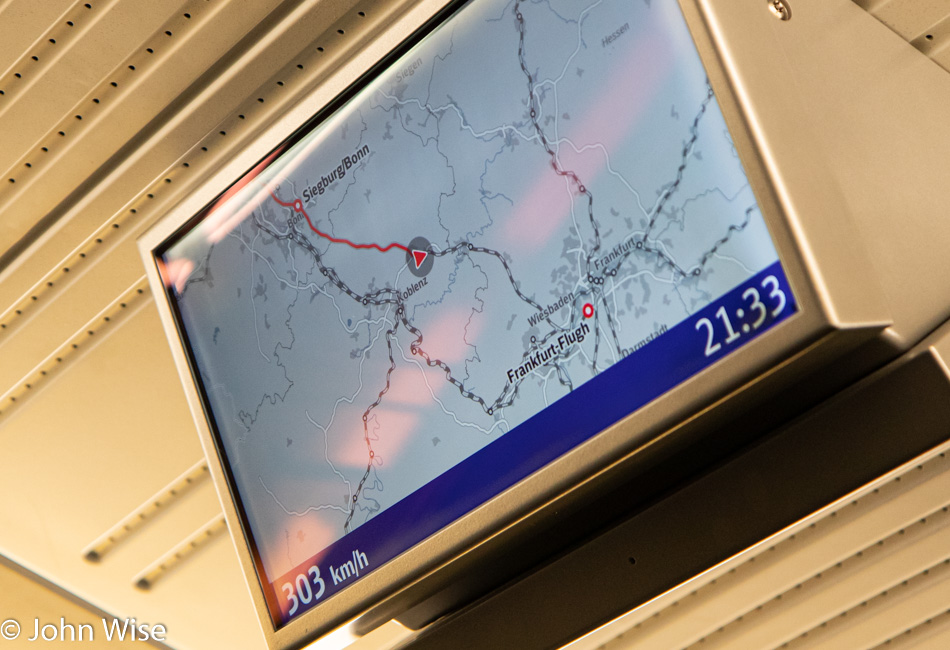
While waiting at the Siegburg/Bonn station, a policeman noticed our state of anxiety and asked if he could help. We explained the situation and that we simply had to board the next train south and hope to be back in Frankfurt at a reasonable hour. He explained that we could board either train heading south, which was both running late, and that we shouldn’t forget that we’d have to transfer after reaching the airport. Waiting together, we made small talk, including my admission that in my younger years, I was able to fast-talk myself out of speeding tickets by playing the dumb American who’d left his passport in his hotel room even though I was technically an illegal alien who’d stayed well over the time I could have been considered a tourist. Back on a train, we were soon pushing close to 200mph as we rocketed over Germany for the brief trip that returned us home.

Back in Frankfurt at the airport, we had more than a few minutes to wait for our next train, and there was the policeman we’d been talking with prior to leaving the Bonn area. We learned a lot from this incredibly friendly officer of the law. While we’ve been here in Germany, we’ve seen ACAB sprayed in graffiti all over the place; it stands for “All Cops Are Bastards.” With over 308,000 men and women in the German Polizei, I find it impossible to characterize all of them as bad. This, though, is the perception that pop culture has created a large part of the blemish on their profession due to a kind of cultural appropriation, where white and Turkish youth culture identifying with American minority movements are acting like German police are serving up injustice across Germany. There have been ugly, apparently racially motivated, or at least excused shootings by law enforcement in America that have seen rally cries from appropriately irate people of color who are feeling like targets of an unjust system. While black Americans and other minorities may have justification for their resentment of what appears to be a biased system, there is scant evidence in Germany of racially motivated socio-economic-driven pressure to oppress entire classes of people.
The officer explained how the average age of a policeman in Germany is now 45 years old and that recruitment is very difficult under the public perception that cops are generally bad people. He pointed out how German officers across Germany only discharged a total of about 70 bullets in 2017, while in America, officers are known to have discharged 40 bullets or more in one incident, occasionally firing over 100 rounds at suspects. For comparison, in the United States, hundreds of people a year are shot and killed by law enforcement officers, while in Germany, since 1963, the year I was born, German officers have shot and killed a total of about 484 people, or about eight people per year.
So why are German police being victimized by this general perception of police brutality? It’s likely in large part due to entertainment neither respecting borders nor coming with warnings not to generalize and demonize these officers who, by and large, work hard to protect the largest part of the population from insanity, greed, hostility, and violence. I don’t believe politicians and media pundits care about correcting these perceptions, as society needs its boogeymen and people who can absorb the derision of the angry horde who need to cast blame on someone, anyone. If the hostility wasn’t directed at law enforcement, it might be directed at those who are failing to lead us politically or who are really abusing us with fear-mongering and bloodletting that has the unwashed masses tuning in for their dose of titillation.
Look, I’ve had my own fair share of encounters with policemen, some of whom could easily be called dicks. They can appear to be unemotional control freaks though they are who we entrust to handle situations that would make meeker people shit their pants in fear or perform instance justice on persons who just violated a child for the expediency of gaining revenge for the victim, but day in and day out they mostly all perform their jobs with the dignity that we’d hope for. Our bias to paint them as a bad lot because of a few horrible instances where, on rare occasions, the proverbial bad apple does something unconscionable is a disservice to ourselves and to the incredible number of people who literally sacrifice their own safety for our own. It’s sad that we are so emotionally fragile and prone to want to see others victimized when we think they can handle it; police officers are just as human as the rest of us, even when they are playing the badass. Thanks, anonymous German officer, who had the time to help us get to where we needed to go and helped us understand a different point of view regarding his profession.
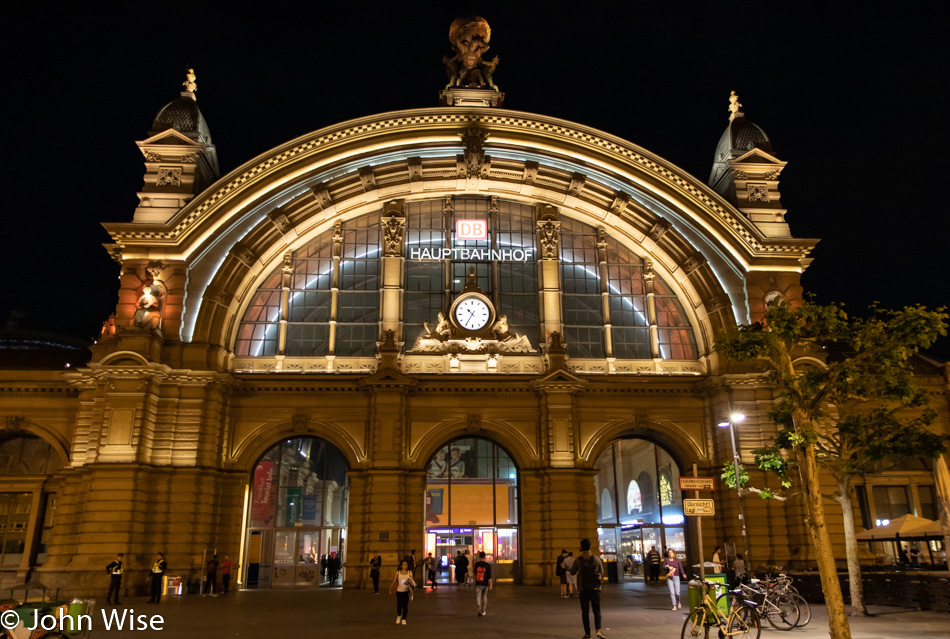
Ah, the familiar sight of the Frankfurt Hauptbahnhof. It’s 10:30 p.m. by the time we emerge back into the city, and we are hungry. There are plenty of fast food joints still open, but we want a traditional German dinner as we can never have enough German food.
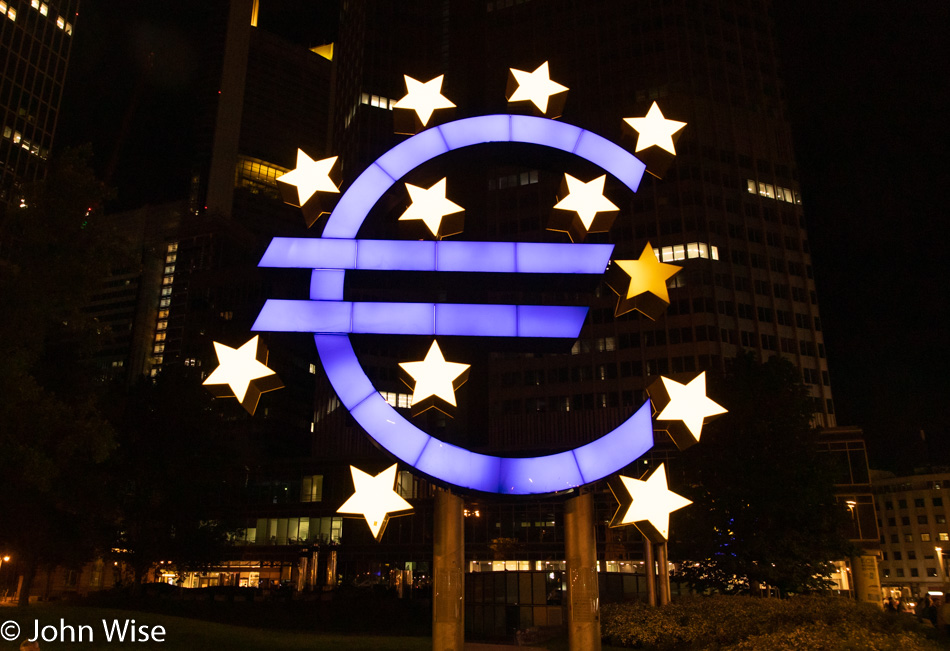
Not far from the European Central Bank and near Willy-Brandt-Platz, we headed over to Restaurant Klosterhof, which has great reviews and a kitchen that’s open until 11:30 p.m. six days a week. We had a great server and a great meal, while our expectations were actually quite low. Why were they low? Because we were not in Sachsenhausen, maybe this place catered to tourists. Instead, I had an incredibly memorable meal called Schlägler Chorherrenschnitzel, which is a veal schnitzel fried in butter, topped with bacon, slices of apples, and lingonberry, covered with melted cheese, served with a fried egg and fried potatoes, a.k.a. Bratkartoffeln. This was no common schnitzel, I can tell you, as it originates as a dish served to Abbot Dominik Lebschy, who restored the Order of the Premonstratensians at Schlägl Abbey in Upper Austria back in the mid-19th century.
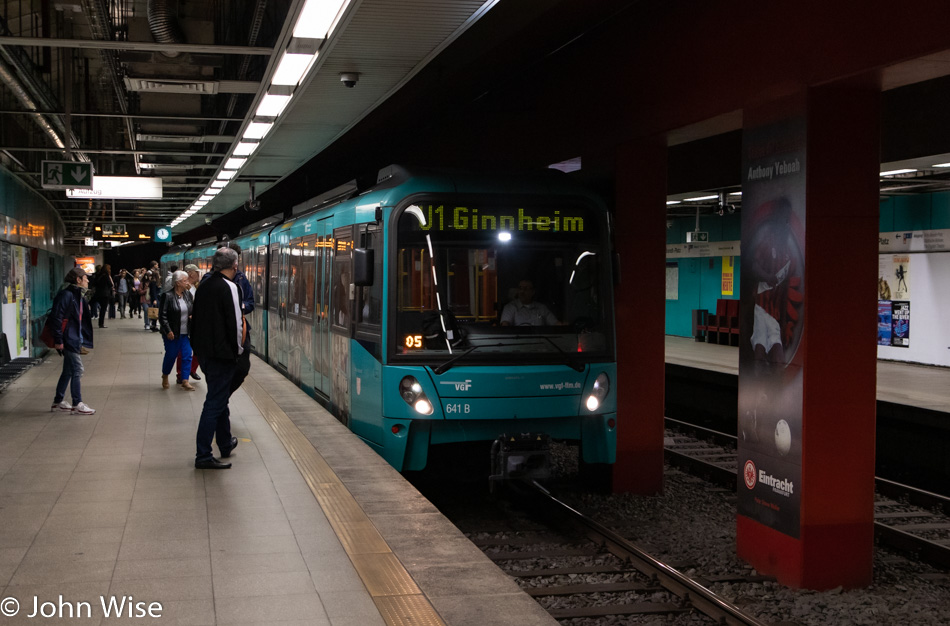
It’s midnight as the train shows up to take us out to Heddernheim.
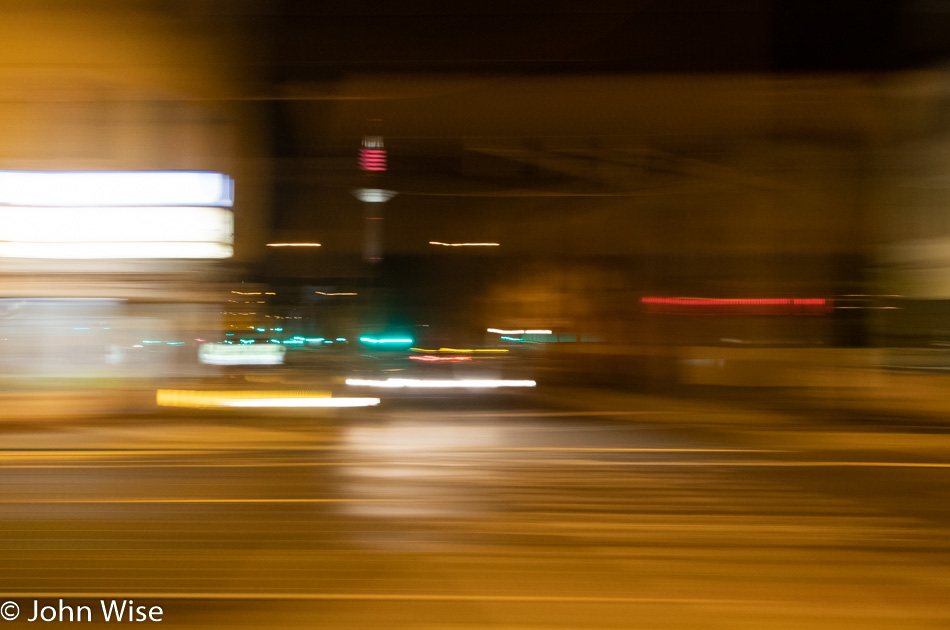
We are hardly alone on the train as many people are heading out of the city back home while others are traveling in the other direction as they venture into various nightclubs and parties that will be going on well into the morning. If we weren’t getting up early in the morning to go to the Konstablerwache Market and visit with Jutta, I think Caroline and I could have easily wandered around the city for a couple more hours simply taking in life in a city that seems to always be on the go.